Gabala, Azerbaijan
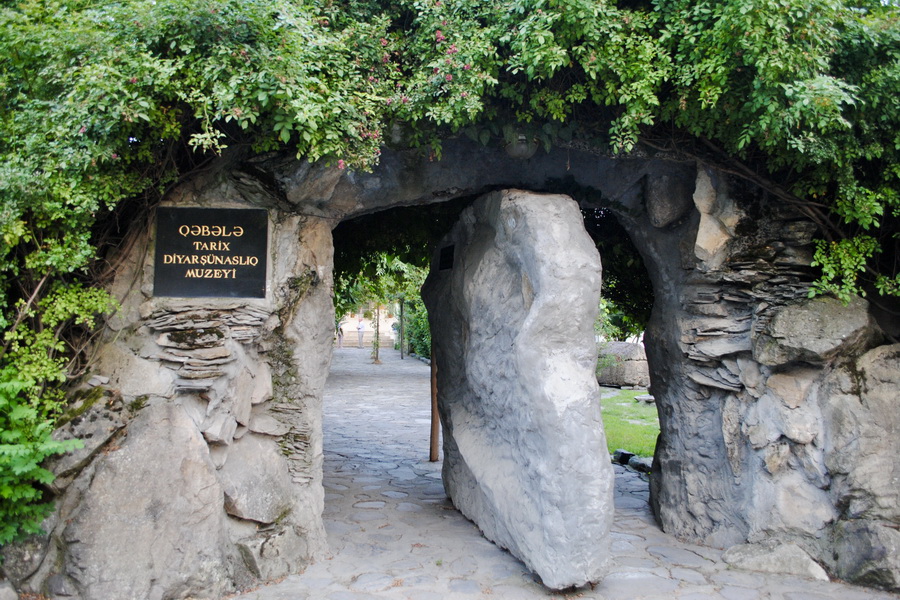 Gabala Historical Ethnography Museum, Gabala, Azerbaijan
Gabala Historical Ethnography Museum, Gabala, Azerbaijan
Tours, Attractions and Things To Do in Gabala
Gabala Travel Guide
Nestled amidst picturesque mountains in northern Azerbaijan, Gabala (Qabala) is a city steeped in ancient heritage. Though the population barely exceeds 14,000, its status has risen from a small village during Soviet times to a renowned travel destination today. Teeming with an abundance of cultural, historical, and natural attractions, Gabala's quaint streets are frequently thronged by tourists throughout the year. Elevated around 800 meters above sea level, the city provides a perfect retreat during the sweltering summer months.
Visitors flock to Gabala to take in the panoramic vistas of the three neighboring mountains: Bazarurd, Tfana, and Bazarduzu. Adventurous spirits are lured by the multi-tiered 'Seven Beauties' waterfall, while food enthusiasts relish the unique, traditional cuisine on offer.
Equipped with its own airport, ski resort, and amusement park, Gabala offers a plethora of exhilarating activities. Whether you're interested in quad biking, hiking, hunting, fishing, or paragliding, there's never a dull moment in this vibrant city.
For those seeking rejuvenation, Gabala's thermal springs and oil baths offer the perfect remedy. Simultaneously, the city boasts an impressive array of high-end hotels, resorts, and sanatoriums, each providing world-class service, spa facilities, and health improvement programs.
To put it simply, Gabala has something for everyone. Rest assured, your time in one of Azerbaijan's most breathtaking destinations will leave you with nothing but fond, lasting memories!
History of Gabala
Dating back to times before the Common Era, Gabala is an ancient city steeped in history. Its first recorded mention as the settlement of Kabalaka can be found in historical texts from the 2nd century BC, suggesting the area was bustling with life even earlier. Serving as a prominent hub for surrounding territories, the settlement was fortified with towering walls and sturdy towers. Over the centuries, Gabala changed hands between various empires, each contributing to its unique amalgamation of traditions.
From the 1st to the 5th centuries AD, Gabala was the royal seat of the Arsacid Albanian kings. However, by the 10th century, the influential dynasty of Shirvanshahs, Arab rulers, seized control. Interestingly, while the former rulers were Christian, the latter were Muslim. This period, the early Middle Ages, was rife with challenges, including raids from mountain tribes and the constant threat of formidable neighbors. In these uncertain times, Gabala's residents sought refuge behind the city walls, often enduring prolonged sieges. Consequently, a network of aqueducts was built in the 6th and 7th centuries, using clay pipes to ensure a consistent water supply. Clay also served as a material for roofing tiles, providing shelter for the houses.
Archaeological digs within Gabala have unearthed various remnants of everyday life, including tandoor ovens, bathhouses, and foundations of residential and utility buildings, painting a picture of a fully self-sufficient city.
In the 16th century, the city's fortress suffered extensive damage under the onslaught of the Safavid dynasty troops. Power transitioned to the Kutkashen Sultanate during the late Middle Ages. By the 19th century, Eastern Transcaucasia, including Gabala, was incorporated into the Russian Empire, and later in the 20th century, it became part of the USSR.
Today, Gabala's rich, multi-faceted history is evident in its preserved cultural heritage. Visitors can literally touch the remnants of the past and immerse themselves in the historical narrative of this intriguing city.
Gabala Landmarks and Attractions
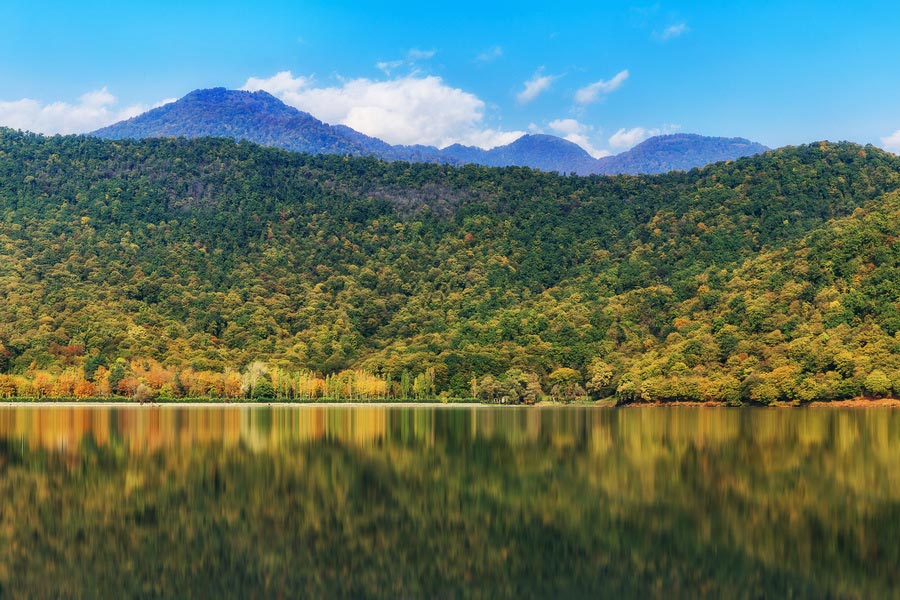
If Gabala is on your travel agenda, you'll want to earmark 2-3 days to fully experience the myriad of attractions the city and its surroundings offer.
Your adventure should begin with a deep dive into Gabala's rich history. Make your way to the ruins of an ancient city, home to towering edifices, whose age stretches back hundreds of years. Once the hub of Caucasian Albania, this citadel bears testimony to an age-old civilization that thrived long before our time.
A visit to Gabala Archaeological Center will round off your historical exploration. Here, you'll come face-to-face with a host of artifacts unearthed from archeological excavations. As you survey the grassy hill, once the site of a formidable fortress, it's hard to believe that it was the nerve center of an ancient state that historians often compare to the likes of Troy and Pompeii.
Having had your fill of history, it's time to immerse yourself in Gabala's natural wonders. The tranquil Lake Nohur, a short distance from the city, is a sight to behold. Take a leisurely stroll by the lake, reveling in the calmness and breathtaking views of the still water against the backdrop of mountains. For a different perspective, consider a horseback ride around the lake or even a catamaran ride - a perfect choice for those preferring a more laid-back vacation. Bordering the lake, you'll find cozy cafes and souvenir shops. Both locals from Baku and tourists visiting Gabala love spending time here, thanks to its tranquil ambiance.
Last but not least, don't miss the chance to explore the sights near Gabala. The famed "Seven Beauties" waterfall is a case in point. Its ethereal beauty and the stunning natural surroundings make it a magnet for visitors. Here, the air is always fresh, and the tree crowns interlace along the trail to the waterfall, providing a refreshing coolness. The waterfall owes its unique name to the multiple streams of water that gush down the green mountain slope.
For culture enthusiasts, a visit to the village of Nij to meet the Udi people is an absolute must. This unique ethnic group, numbering fewer than 10,000 worldwide, has half of its population residing here. Nij is famed for its flourishing gardens and the Udi temple Chotari, or the St. Elisha church, constructed in the 18th century. The Udins, indigenous to this region, have safeguarded their culture and language throughout millennia. The village residents, practicing Christians, cherish their faith and frequently visit the recently restored Chotari Temple. The local folks are exceptionally welcoming, always ready to assist visitors with questions and give tours, sharing stories about the unique aspects of their village life and notable local sites. Likely, they will suggest you explore the 16th-17th-century Udi cemetery, where tombstones feature not only crosses but also depictions of angels, various designs, stars, and abstract carvings. Certain ancient graves, still in use, are marked by enormous river boulders without any identifiers. This mysterious, slightly eerie spot is perfect for thrill-seekers.
As you wander the streets of Gabala, be sure to visit the New Mosque. This stunning house of worship, admired by individuals of all faiths, stands majestically in the city center, marked by a tall minaret and adorned with national-style ornaments. The mosque houses a spacious hall where worshipers gather in an atmosphere of tranquility, praying fervently to the soothing chants of a mullah reciting namaz. Religious symbols and suras from the Holy Quran embellish the walls and pillars. The mosque's interior, a testament to harmony and opulence, is impressive, with ornate patterns gracing the dome, tiered chandeliers illuminating the ceiling, and plush carpets covering the prayer hall's floor.
Families visiting Gabala with children should make a point to stop by Gabaland Amusement and Recreation Park, the largest of its kind in Azerbaijan. Spread over an extensive area of more than 16 hectares, the park offers an array of amusement rides catering to all age groups. Amenities include a go-kart track, roller coaster, water park, paintball field, Ferris wheel, two race tracks, cinema, swimming pool, and several carousels, as well as a catamaran pond. Pony and horseback riding opportunities are available, and when you're ready to rest and refuel, head to the park cafe. Its terrace affords stunning views of the surrounding mountains.
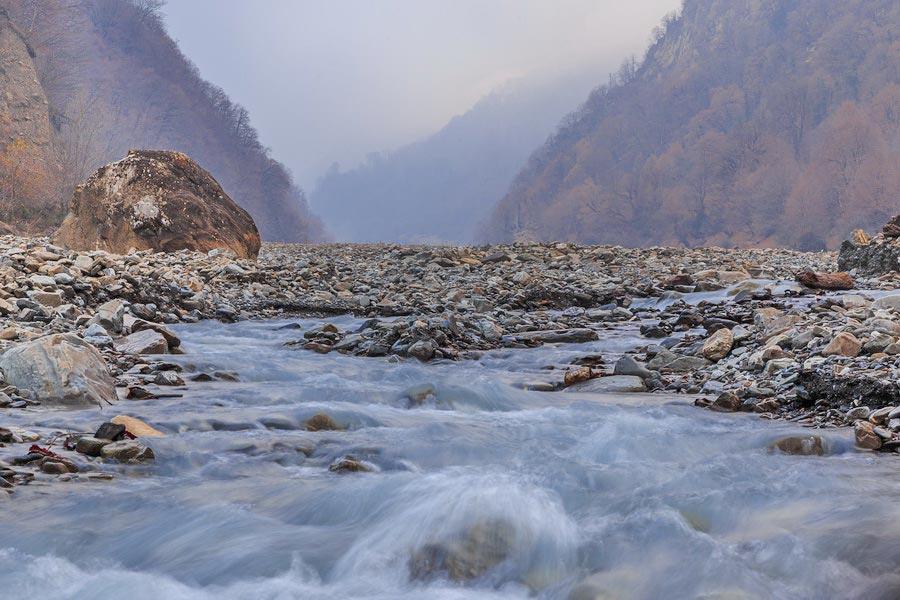
A short distance from Gabala, you'll find the quaint village of Vandam. Locals joke that its name is a tribute to famed American actor Jean-Claude Van Damme, even featuring a playful sculpture depicting the actor performing one of his signature splits. The true gem of Vandam, however, is the Bucket Market. Here, you can purchase a range of fruits, vegetables, berries, and nuts, all grown by the local villagers. The vibrant array of market stalls is a feast for the eyes and a popular spot for tourists looking to snap colorful photos. Vandam also boasts numerous woodcarving workshops and a carpet making studio.
A mere three kilometers from Gabala sits the renowned Azerbaijani winter resort Tufandag. It's a haven for skiing and snowboarding enthusiasts, offering multi-level trails, ski lifts in regular operation, equipment rental, and comfortable accommodation options, including cafes and restaurants. The season kicks off in December and wraps up in mid-March.
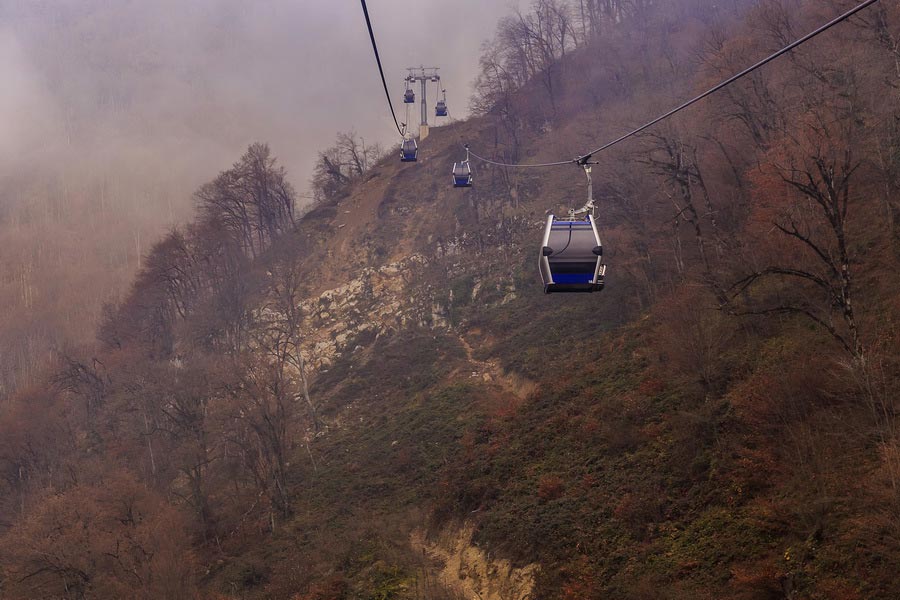
For those seeking more adrenaline-filled activities, Gabala offers paragliding, mountain climbing, and ATV rides to mountain villages. The local shooting club caters to both professionals and amateurs with rifle shooting, archery, and paintball. Alternatively, for a tranquil retreat in nature, consider visiting the popular tourist centers such as Sameran, Sahil, and Ay Ishigi.
Gabala Cuisine
Even though it's a small town, Gabala promises an unforgettable vacation for everyone, appealing to both food enthusiasts and lovers of traditional national cuisine.
You'll find an array of cafes and restaurants in Gabala serving hearty dishes made from fresh local ingredients and cooked following traditional recipes that have been meticulously preserved and passed down through generations.
Fondly nicknamed the "Azerbaijani capital of pickles," Gabala stands out for its variety of pickled goods that extend beyond just vegetables to include grapes, apples, cornel, garlic, quinces, and even watermelons. Their pickled cucumbers are particularly noteworthy, boasting a distinctive white hue rather than the usual green. Bringing home a jar of these unique pickled treats from Gabala makes for an excellent souvenir.
The gastronomical highlight of Gabala is undoubtedly the dasharasi kebab, a kebab prepared on hot mountain rocks. A makeshift grill is constructed from large boulders on the ground where sizeable chunks of lamb soaked in a mint marinade are roasted until a golden crust forms. As the meat fat drips onto the coals, it creates a smoke that permeates the meat, infusing it with a unique flavor. This smoky kebab is a true local delicacy!
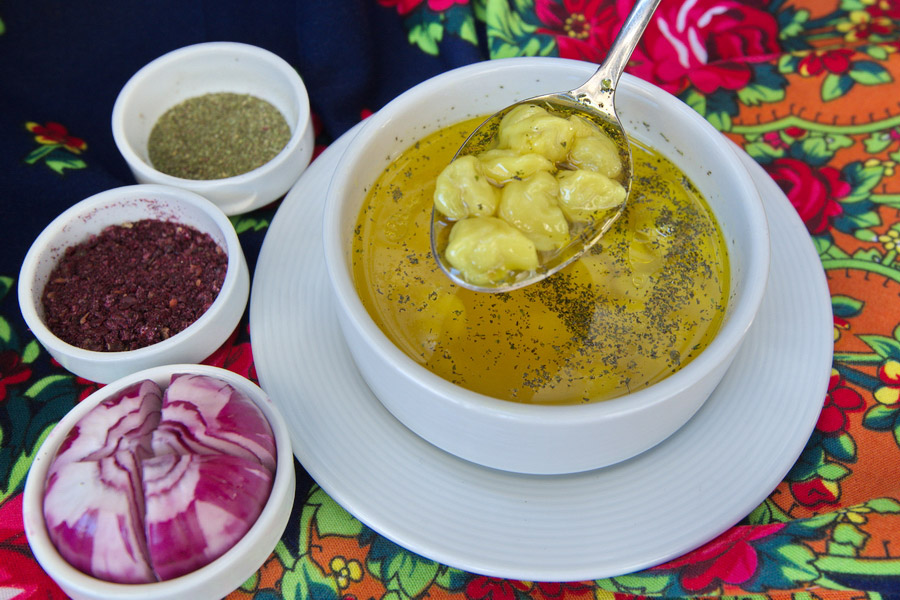
While in Gabala, you should definitely try dyushbara – a traditional Azerbaijani dumpling soup prepared in a meaty broth. This dish is served with dried mint and sour cream. The best place to enjoy dyushbara is at the Ximzali restaurant, where the chefs specialize in crafting flavorful soups.
Another local delight is a snack called doymech – a light salad made from pieces of cherry, plum, and chopped greens. It's a staple in every restaurant, so make sure to give it a try!
Near Gabala lies the village of Hamzali, renowned for its halva production, which has been ongoing for many years. The halva is made following a special recipe kept strictly confidential by the locals. But they generously serve this delectable treat to all who visit them for this special delicacy.
What to Bring back from Gabala?
Gabala is the perfect city for immersing yourself in traditional Azerbaijani culture, and, of course, it's an excellent place to find unique souvenirs and gifts for friends and family.
You can find products made from pomegranate, the symbol of the country, at the Gabala market and in any souvenir shop. Especially good are the juices, jams, and preserves made from this fruit. Magnets, postcards, and keychains depicting or in the shape of a pomegranate are also very popular among tourists.
Copperware. Azerbaijan has a long history of crafting items from copper, and Gabala's artisans are particularly skilled in this art. Trays, teapots, pitchers, cups, spice mortars, and coffee pots are not just practical kitchen items; they are true works of art that will take a deserved place in the interior of your home.
Honey products. Gabala is surrounded by chestnut forests, and gardens grow everywhere, filling the air with floral scents. Gabala honey is renowned throughout Azerbaijan. Besides liquid honey in jars, you can purchase honeycombs and even hand-made soap with added honey.
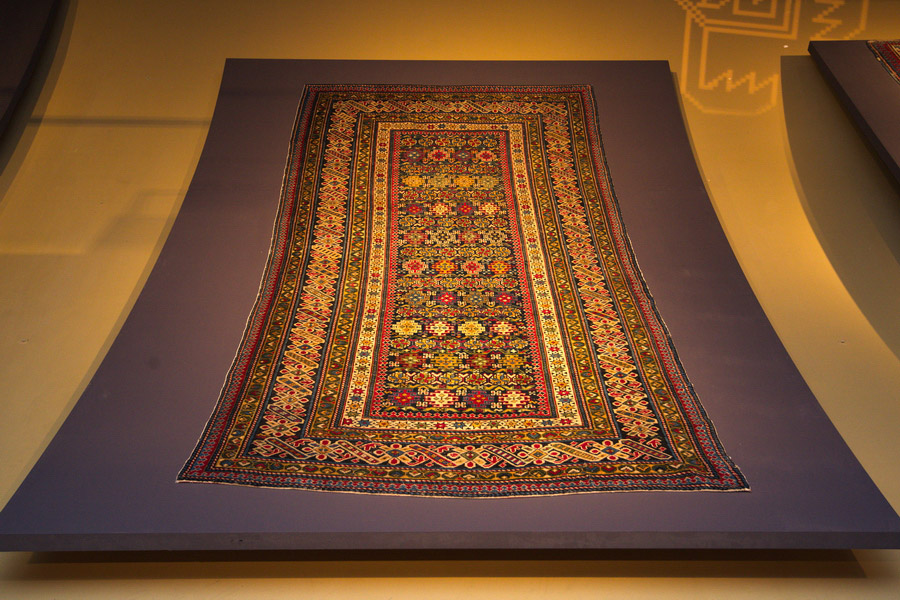
Carpets in Azerbaijan are a unique element of culture. Carpet weaving has been cultivated, developed, and revered since ancient times. In Gabala, you'll find specialized stores selling hand-woven carpets featuring unique patterns and designs, meticulously crafted by Gabala's skilled artisans.
Gabala will present Azerbaijan to you from a new, unexpected perspective. The cuisine, nature, friendliness, and hospitality of the locals, as well as a wide variety of attractions, will make your journey filled with positive emotions and provide unforgettable impressions!

